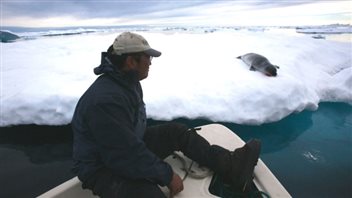It’s a long-standing dispute between Canada and the European Union over the issue of seal skin products.
In 2009, the EU had placed a ban on importing seal-products, such as seal fur clothing, with the exception for indigenous peoples.
This meant that seal products from Greenland for example, where seal-hunting is primarily an indigenous occupation were allowed but that skins and other seal products from Canada were not.

The problem for Canadian seal products is that there was no way to verify or differentiate seal products that came from indigenous sources from those from the commercial hunt.
There has been a commercial seal hunt, primarily in the Gulf of St Lawrence, and Newfoundland, since the 1700’s and Canada had challenged the EU ruling at the World Trade Organization, without success.
This week, no less than four Canadian cabinet ministers were present at a news conference in the capital, Ottawa, to announce a deal with the EU to ensure seal products from indigenous sources may be sold in the 28-member EU states.
The joint Canadian EU statement does not immediately enable Canadian indigenous seal products into Europe, but rather sets a framework for future discussions towards identifying and enabling Canadian seal-products from indigenous sources to be sold in the EU.
The statement establishes that Canadian and EU officials will:
-ensure that nothing prevents the participation of Canadian non-Indigenous persons and organizations from processing, manufacturing and marketing Canadian Indigenous seal products;
-explore possibilities for supporting Indigenous communities and traditional ways of life through capacity building and the exchange of best practices;
-explore how Indigenous communities can benefit from the new opportunities opened up by the Canada-European Union Comprehensive Economic and Trade Agreement to develop their economic, social and environmental potential; and
-ensure that Indigenous seal products imported into the European Union are not limited due to their type or intended purpose.
The International Human Society Canada, which has long been a staunch opponent of the commercial seal hunt, says it applauds the move.
In a statement on its website, executive-director Rebecca Aldworth is quoted saying, “We have never campaigned against Inuit subsistence sealing, which occurs in a different part of the country, at a much smaller scale, for different reasons.”
The Canadian Sealers Association in a press release statement on its site, connected to the signing of the CETA trade deal with Europe says, it was “very disappointed” with the deal which appears to indicate Canada has given up on it’s efforts to overturn the ban on products from the east-coast seal hunt, and accept only the EU condition of an exemption for aboriginal products.
It also says sealing is an important part of life in Atlantic Canada, and represents an important annual income. It also says that a strong commercial hunt is needed to keep the seal population from getting out of control in a delicate environment.
While Inuit are pleased some progress is being made, Terry Audla, president of Inuit Tapiriit Kanatami, says the deal still won’t solve the problem of low prices for seals in all markets which he says is caused by the EU’s import ban.
,







For reasons beyond our control, and for an undetermined period of time, our comment section is now closed. However, our social networks remain open to your contributions.